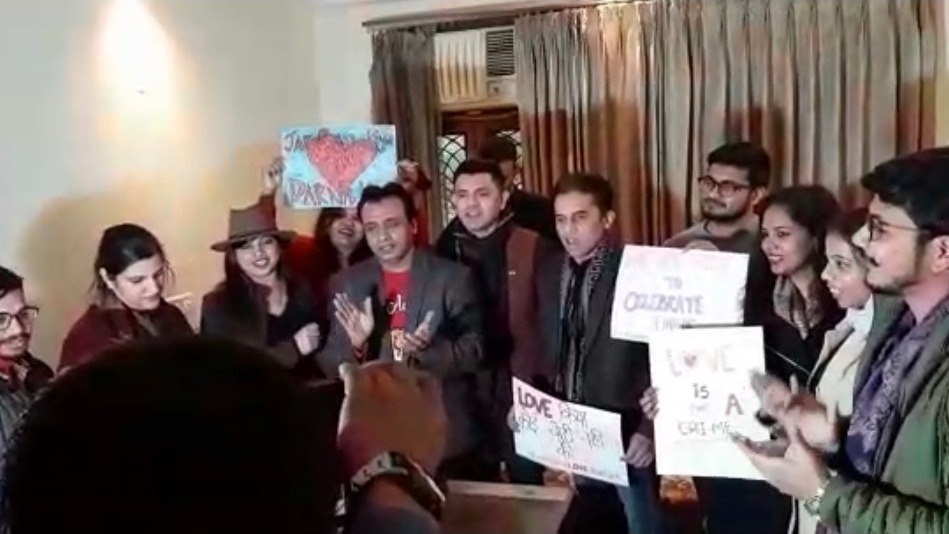New Delhi: In an effort to bring attention to the brazen infringement of the citizens’ inalienable right to love and choose a partner, I along with activist Tehseen Poonawalla and social scientist Akriti Bhatia started a movement called ‘India Against Love Jihad Law’.
We organised a celebratory, peaceful event on 3 January 2020 at Jantar Mantar, here in India’s capital. We were to be joined by various interfaith partners, who had travelled from far to share their beautiful love stories.
The idea was to inspire hope in difficult times, to celebrate love in a country that is increasingly becoming polarised by hateful rhetoric, and to combat the goli-maro-saalo-ko (shoot them) narrative with an outpouring of genuine, heartfelt love.
Much to our disappointment, a member of team ‘India Against Love Jihad Law’ was unofficially told by a Delhi Police official that they had “orders from above” to not allow “such couples” to hold an event. In an official written communication, however, the authorities denied permission citing Covid-19 restrictions.
While it is understandable that reasonable restrictions on the right to assemble may be imposed in lieu of maintaining law and public order, of late, there seems to be a blanket ban on all public demonstrations against state policies. If the concern is the spread of Covid-19, then reasonable restrictions ought to apply to all equally.
Instead, what we are witnessing is a selective and convenient use of COVID-19 as a reason to stall any legitimate criticism of the central government.
On 11 December 2020, leaders and workers of the BJP staged an indefinite protest near residences of ministers of the Kejriwal government. The Delhi police, who report to the central government, did not then find it necessary to intervene on account of the pandemic.
When four members of legislative assembly (MLAs) of Delhi ruling Aam Aadmi Party (AAP) were on their way to a protest outside Home Minister Amit Shah’s residence on 13 December 2020, they were arrested by the Delhi police. These MLAs had sought permission for the protest, but it was rejected by the police citing Covid-19 safety guidelines.
Delhi's Shaheen Bagh, where protests against the Citizenship Amendment Act, 2019 (CAA) were being held, too was cleared by the police in the wake of the coronavirus. Likewise, the farmers protest was halted before it reached Delhi citing Covid-related restrictions. Yet, many social congregations, including weddings and crowds at malls, were left unchecked in the national capital when the pandemic was at its peak.
See Related Stories:
Interfaith Marriage & The Constituent Assembly
Uttar Pradesh’s ‘Love Jihad’ Law Is Sexist, Unconstitutional
The UP Govt Has Effectively Banned Interfaith Marriage
The Delhi government has limited all social gatherings to up to 50 persons. Nevertheless, Prime Minister Modi on 10 December 2020 laid the foundation stone of the new parliament building in Delhi, an event attended by at least 100 people, if not more.
Amidst the sharp rise in Covid-19 cases, the Delhi government itself organised a concert in Central Park where thousands of people gathered to celebrate Diwali.
Despite repeated assurances by us that there would be no more than 50 people and that all social distancing norms would be followed, the Delhi police chose to suppress a simple celebration of love.
This denial of permission to gather peacefully is an attack on the fundamental right to assemble and appears to be aimed at shutting down those who speak against government policies.

To ensure that the efforts of the interfaith couples attending the event were not in vain, we assembled at a private place. It was a joyous, if small, gathering.
The Supreme Court’s recent judgment in the Central Vista Project extensively discussed the importance of a participatory democracy.
The Court held that “we are a representative democracy with strong elements of participatory democracy embedded in it.” ‘India Against Love Jihad Law’ is a citizens’ movement based on this very concept.
We have once again sought permission to assemble peacefully on 10 January, 2021, and are hopeful that we will be granted permission to hold the event this time, for all we seek to do is celebrate love.
Going forward, we will continue to gather support and spread our message by holding similar events across the country, particularly in states where the ‘love jihad’ legislation has been passed or is being contemplated.
(Mani Chander is a practicing lawyer based in New Delhi.)

